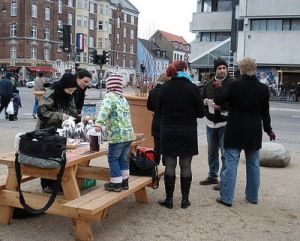News
Denmark will have up to 400,000 more immigrants by 2060 – report
This article is more than 7 years old.
Immigration is a vexed question that employers see as largely positive, but a number of political parties see as a threat

If the trend continues, Denmark will increasingly become a more multicultural society (photo: Benno Hansen/Flickr)
Despite the best efforts of some of Denmark’s political parties, people still seem to want to come here to live and work.
According to a new forecast from the national statistics keeper Danmarks Statistik, by 2060 there will be 867,258 non-western immigrants or their descendants living in Denmark – 13.1 percent of the population, reports Berlingske and Jyllands-Posten.
The current figure is 493,468 and comprises 8.5 percent of the population.
Filling a labour shortage
The confederation of Danish industry, Dansk Industri (DI), sees the development as positive. DI’s deputy head Steen Nielsen points out the numbers should be seen as a resource.
“A lot of new jobs are being created and there is a need for people, so it is a really good time to do something to improve integration,” said Nielsen.
READ ALSO: Booming economy gives record numbers of jobs but labour shortage looms
More control needed
However, the Venstre immigration spokesperson, Mads Fuglede feels the numbers underline the need for a restrictive line towards refugees.
“This tells me it is very important we gain control of the stream of asylum-seekers coming to Denmark. It is of course less problematic when you have people coming and working than if people come who are not willing to integrate and have skills that are difficult to utilise in our labour market,” said Fuglede.
This hard line was echoed by Socialdemokratiet’s immigration and integration spokesperson, Mattias Tesfaye, who pointed out that over the last 10 years some 100,000 residence permits have been given out to refugees and for family reunification.
READ ALSO: Socialdemokratiet back stringent measures towards refugees
“Many of these people need help from psychiatrists of which there is currently a shortage and, on top of that, they are often unskilled labour,” said Tesfaye.
Undermining the welfare state
Other experts are worried that the Danish welfare system could suffer if there is not better integration of non-western immigrants.
“The funding of our welfare state is built on the model of a large proportion of the population being employed,” said Jan Rose Skaksen, the research head at the Rockwool Foundation. “If they are not, they don’t contribute and some of them will cost money in the form of benefits,” he added.
At present, 55 percent of the male non-western immigrants are employed, whilst the figure for women is 46 percent.
In comparison, the equivalent figures for ethnic Danish men and women are 77 and 74 percent respectively.










































